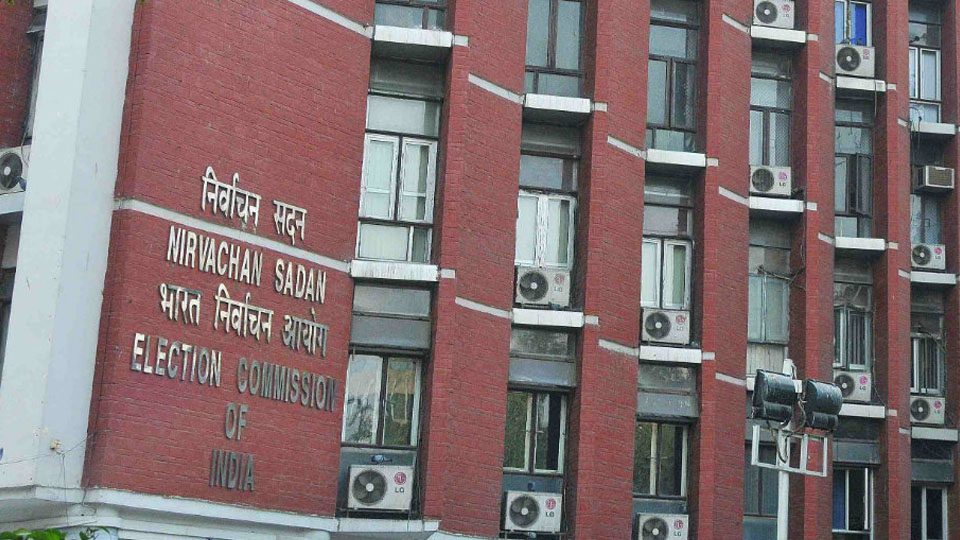Reading Time: 4 minutes
There are some problems like the preparedness of the Election Commission, which has calculated the cost to about Rs 45 billion to implement the concept while the 2014 Lok Sabha elections alone cost Rs 39 billion. The Chief Election Commissioner has virtually ruled out simultaneous polls without the backing of Parliament. If the term of some state assemblies needs to be curtailed or extended, then a constitutional amendment will be required. A report for Different Truths.
With the BJP leaders including Prime Minister Narendra Modi advocating ardently ‘One Nation, One Poll,’ there are questions in the political circles whether it is possible or feasible before the next Lok Sabha polls, and if not, why are they talking about it. Senior BJP leader Prabhat Jha says: “We also know it is difficult but we are preparing the nation slowly to accept the idea and that is why we are raising it in every forum.” Speculations about advancing the Lok Sabha polls for this purpose have been put to rest after the BJP chief Amit Shah has made it clear that they will be held as per schedule.
So why is the BJP singing “one nation one poll” chorus? It is not a new idea, as the party has been raising it for some time. From former President Pranab Mukherjee to the present President Ramnath Kovind also have supported this idea. The BJP manifestoes of 2009 and 2014 had promised to evolve a method for simultaneous polls.
Secondly, the BJP has invoked national interest for implementing the idea. After all simultaneous polls were held in 1951-52, 1957, 1962, and 1967. This cycle was disrupted due to premature dissolution of some state assemblies and frequent use of Article 356. Since 1952, Article 356 of the Constitution that provides for imposition of President’s rule has been used 116 times.
Thirdly, Prime Minister has cited four valid reasons for adopting this concept. They are – massive poll expenditure, diversion of security and civil staff from primary duties, impact on governance due to the model code of conduct and disruption to normal public life. Critics have pooh-poohed all these arguments.
The Opposition, on its part, is apprehensive about Prime Minister taking the country towards a presidential form of government fearing it might help Modi to come back even in Opposition-ruled states because of his personal popularity and might make him stronger within the party, within the Sangh Parivar and diminish the seats for the Opposition. Also there is clear evidence that most Indian voters vote for the same party when simultaneous polls are held.
Moreover, there are some problems like the preparedness of the Election Commission, which has calculated the cost to about Rs 45 billion to implement the concept while the 2014 Lok Sabha elections alone cost Rs 39 billion. The Chief Election Commissioner has virtually ruled out simultaneous polls without the backing of Parliament. “If the term of some state assemblies needs to be curtailed or extended, then a constitutional amendment will be required… Logistics arrangements with regard to 100 per cent availability of VVPATs (paper trail machines) will be a constraint.” The EC will require nearly 2.4 million EVMs, double the number required to hold only the Parliamentary polls.
That brings us to the question of Constitutional amendments. What about early dissolution or extension of assemblies? Article 83(2) and Article 172 of the Constitution stipulates that “The Lok Sabha and state legislatures be in existence for five years from the date of its first meeting “unless dissolved earlier”. There are question like what if the Central Government itself falls before completion of its five-year term? The Law Commission and Election Commission will have to ponder over these. At least five constitutional amendments need to be enacted. While the BJP and its allies are in a majority in the Lok Sabha, Rajya Sabha may pose a problem where it is in a minority.
Besides the Law Commission is still in the process of examining the proposal and recently the BJP chief Amit Shah has conveyed the BJP’s acceptance of the idea. Some parties like the BJP, Shiromani Akali Dal, Samajwadi Party, and Telangana Rashtra Samithi have supported the idea. The DMK, AIADMK, Trinamool Congress, JD(S), Goa Forward Party, Aam Aadmi Party, Telugu Desam Party, the Left parties, Nationalist Congress Party and DMK, AIADMK, Trinamool Congress, JD(S), Goa Forward Party, Aam Aadmi Party, Telugu Desam Party, the Left parties, Nationalist Congress Party have all opposed the idea. What is lacking is the political consensus, which the government is yet to build up.
There are speculations about the Modi government toying with the idea of holding simultaneous elections to the Lok Sabha and 11 Assemblies, mostly BJP-ruled, primarily to undercut anti-incumbency and to derive political advantage. They are Arunachal Pradesh, Rajasthan, Madhya Pradesh, Chhattisgarh, Maharashtra, Haryana, Odisha, Andhra Pradesh, Telangana, Bihar and Jharkhand. But the government has to prepare the Election Commission for this.
No doubt holding simultaneous polls is an advantageous idea but the question is about the timing and the preparedness of the political parties, ensuring readiness of the Election Commission and whether the voters want this. The BJP, if serious should build a political consensus, bring everyone on board, and above all have a wider debate within the country. Only then it will be possible and feasible. It appears that even everything falls in line, it may not be easy to hold simultaneous polls in 2019, but it is possible to move towards that by 2024.
Kalyani Shankar
©IPA Service
Photo from the Internet
















